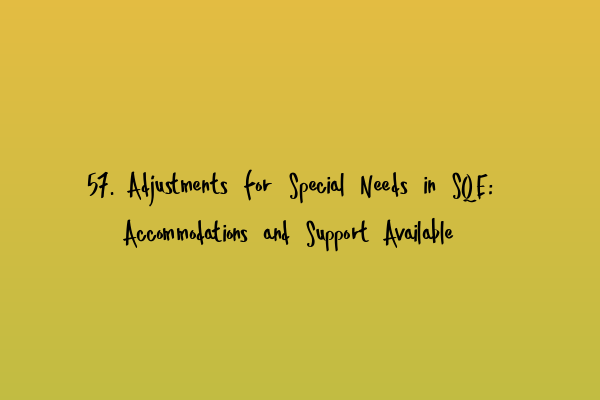57. Adjustments for Special Needs in SQE: Accommodations and Support Available
As the Solicitors Qualifying Examination (SQE) becomes the new route to qualifying as a solicitor in England and Wales, it is essential for aspiring solicitors to understand the accommodations and support available for candidates with special needs. The SQE aims to be an inclusive and accessible assessment, ensuring that individuals with disabilities or specific requirements have the same opportunities to demonstrate their legal knowledge and skills.
In this blog post, we will explore the adjustments and accommodations offered by the SQE to ensure fairness and equal opportunities for all candidates. We will delve into the various support mechanisms available for individuals with special needs, ranging from physical disabilities to specific learning difficulties.
Understanding the Importance of Adjustments
It is crucial to recognize that not all candidates have the same abilities or circumstances. Some individuals may require additional support or alternative arrangements to help them perform to the best of their abilities in the SQE. The SQE acknowledges this and provides a framework for adjustments to be made, empowering candidates with special needs to succeed.
Types of Adjustments Available
The SQE offers a range of adjustments and accommodations based on the individual needs of each candidate. These include:
- Extra Time: Candidates with disabilities or specific learning difficulties may be eligible for extra time to complete the assessments. This additional time allows individuals to work at their own pace, reducing stress and ensuring a fair opportunity to demonstrate their legal knowledge.
- Alternative Formats: Candidates with visual impairments or other print disabilities can request assessments in alternative formats, such as Braille or large print. This accommodation ensures that all candidates have equal access to the examination materials.
- Assistive Technology: The SQE allows candidates to use assistive technology during the assessments, enabling individuals with physical disabilities or specific learning difficulties to access and manipulate information effectively. This includes screen readers, speech recognition software, and other assistive devices.
- Accessible Venues: The SQE endeavors to conduct assessments in venues that are accessible to candidates with physical disabilities. This includes considering factors such as wheelchair access, accessible parking spaces, and appropriate facilities.
- Personalized Support: Candidates who require additional support, such as scribes, readers, or sign language interpreters, can request such assistance during the assessments. The SQE aims to provide the necessary support to ensure that all candidates can fully engage with the examination process.
Applying for Adjustments
If you have special needs or disabilities that require adjustments in the SQE, it is essential to make your requirements known during the application process. The SQE provides a dedicated channel for candidates to request accommodations and support, ensuring confidentiality and fairness.
When applying for adjustments, it is important to provide relevant documentation supporting your request. This may include medical reports, educational assessments, or any other evidence that demonstrates your specific needs. The SQE will review each application on an individual basis, considering the nature of the disability or requirement, and the potential impact on the assessment process.
It is recommended to apply for adjustments as early as possible to allow sufficient time for the SQE to assess your request and make the necessary arrangements. Late applications may not be considered, potentially impacting your ability to fully demonstrate your legal knowledge and skills during the assessments.
Conclusion
The SQE recognizes the importance of providing equal opportunities to all candidates, including those with special needs or disabilities. Through adjustments and accommodations, the SQE ensures fairness and accessibility, allowing individuals to showcase their legal capabilities without being hindered by their circumstances.
If you require any adjustments or support during the SQE, it is crucial to follow the designated process and provide the necessary documentation. By doing so, you can ensure that you are given the opportunity to perform to the best of your abilities.
For further guidance and information on succeeding in the SQE, check out these related articles:
